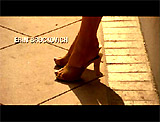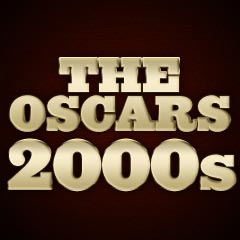|
2000
The winner is listed first, in CAPITAL letters.
Filmsite's Greatest Films
of 2000
|
Best Picture
|

GLADIATOR (2000)
|

Chocolat (2000, UK/US)
|

Crouching Tiger, Hidden Dragon (2000, US/HK/China/Taiwan)
(aka Wo Hu Cang Long)
|

Erin Brockovich (2000)
|

Traffic (2000, Germ./US)
|
Actor:
RUSSELL CROWE in "Gladiator," Javier Bardem in "Before
Night Falls," Tom Hanks in "Cast Away," Ed Harris
in "Pollock,"
Geoffrey Rush in "Quills"
Actress:
JULIA ROBERTS in "Erin Brockovich," Joan Allen in "The
Contender,"
Juliette Binoche in "Chocolat," Ellen Burstyn in "Requiem
for a Dream," Laura Linney in "You Can Count On Me"
Supporting Actor:
BENICIO DEL TORO in "Traffic," Jeff Bridges in "The
Contender,"
Willem Dafoe in "Shadow of the Vampire," Albert Finney
in "Erin Brockovich," Joaquin Phoenix in "Gladiator"
Supporting Actress:
MARCIA GAY HARDEN in "Pollock," Judi Dench in "Chocolat,"
" Kate Hudson in "Almost Famous," Frances McDormand
in "Almost Famous," Julie Walters in "Billy Elliot"
Director:
STEVEN SODERBERGH for "Traffic," Stephen Daldry for "Billy
Elliot," Ang Lee for "Crouching Tiger, Hidden Dragon," Steven
Soderbergh for "Erin Brockovich," Ridley Scott for "Gladiator"
 This
year's Best Picture nominees were from an eclectic, diverse
and varied group of films: two fighting epics (one foreign,
one ancient), two dramas about battles (America's failed drug
war and a legal struggle against a power company), and a simple,
comic fable. Three of the five Best Picture nominees prominently
featured women. The Oscar awards were spread somewhat evenly
among the Best Picture nominees, except for Chocolat. This
year's Best Picture nominees were from an eclectic, diverse
and varied group of films: two fighting epics (one foreign,
one ancient), two dramas about battles (America's failed drug
war and a legal struggle against a power company), and a simple,
comic fable. Three of the five Best Picture nominees prominently
featured women. The Oscar awards were spread somewhat evenly
among the Best Picture nominees, except for Chocolat.
The big winner in 2000 was director Ridley
Scott's spectacular, big budget (over $200 million) sword-and-sandal
Roman Empire epic set in 180 A.D., Gladiator - a basic
tale of good vs. evil, betrayal, and revenge - about an outcast
Roman general (and single-minded rebel-hero) seeking vengeance
for betrayal and his family's death. The spectacle of the Roman
Colosseum's gladiatorial battles and contests was balanced
with royal intrigue involving the resentful heir to the Roman
throne. Its tagline was: "What We Do In Life Echoes in Eternity."
(Note: Although greatly enhanced with CGI-digital effects,
it revived the memory of dramatic historic-epic films and 'sword-and-sandal'
spectaculars of the 50s, such as Quo
Vadis? (1951), Ben-Hur
(1959) and Spartacus (1960).)
The film received twelve nominations and
won five awards: Best Picture, Best Actor, Best Visual
Effects, Best Sound, and Best Costume Design. DreamWorks Studios
boasted back-to-back wins for Best Picture - it also won the
previous year with American Beauty (1999).
Its nominations included the major and minor
categories of Best Director, Best Picture, Best Original Screenplay,
Best Actor, Best Supporting Actor, Best Score, Best Visual
Effects, Best Cinematography, Best Film Editing, Best Art Direction,
Best Sound, and Best Costumes. This marked the first time
in 51 years -- since 1949 (the year that All
the King's Men (1949) had seven nominations and three
wins: Best Picture, Best Actor, and Best Supporting Actress)
that the Best Picture winner didn't also win an additional
Oscar for Best Director or for Best Screenplay.
The other Best Picture nominees included the
following:
- Ang Lee's Mandarin-language martial-arts film, Crouching
Tiger, Hidden Dragon (or Wo hu zang long) (with ten
nominations and four wins), was the biggest-earning foreign
film of all time (at $130 million), and the most-nominated
foreign language film ever. The film's four wins tied it
with Fanny & Alexander (1982, Swed.) as the
Foreign Language film with the most wins. The balletic
martial-arts fantasy and poignant romance was about two
fellow warriors in feudal China in pursuit of a stolen
magical jade sword and a fugitive. It won Best Foreign-Language
film (for Taiwan), Best Cinematography, Best Art Direction,
and Best Score. It was only the seventh foreign-language
film ever nominated for Best Picture in Academy Awards
history, and it was, to date, the foreign-language film
(nominated for Best Picture) with the greatest number of
Academy Awards nominations (10). It was also the first
martial arts film to be nominated for Best Picture. [Dual
nominations in the Best Foreign Language and Best Picture
categories have only happened twice before: Z (1969) and Life
is Beautiful (1998). The two previous films won in
the Best Foreign-Language Film category, as did this year's
nominee.]
- Best Director-winning Steven Soderbergh's
innovative and dazzling Traffic (with five nominations
and four wins), a probing, multi-layered story line depicting
America's losing fight against the drug trade. The independent
film won Best Director, Best Supporting Actor, Best Adapted
Screenplay, and Best Film Editing [Note: to date, it was
the last Best Picture nominee to have been based on a TV
movie or mini-series (UK's Channel 4 TV series Traffik))
- Best Director-nominated Steven Soderbergh's Erin
Brockovich (with five nominations and one win), a David
vs. Goliath tale based on a true story about the title
character - a working-class California woman battling corporate
malfeasance at PG&E (for its coverup and use of the
polluting chemical chromium-6 that contaminated the water
supply of the nearby town Hinkley, California) and eventually
winning a direct-action law suit. Julia Roberts' win for
Best Actress was Erin Brockovich's sole Oscar; actor/director
Danny DeVito received his sole career Oscar nomination
for co-producing Erin Brockovich
- Miramax Studios' and Swedish-born director
Lasse Hallstrom's Chocolat (with five nominations
and no wins), an adaptation of Joanne Harris's best-selling
novel that featured a multi-national cast
Soderbergh competed against himself for Best
Picture (and Best Director) honors for two films with five
Best Picture nominations each. Steven Soderbergh received two
Best Director nominations, for Erin Brockovich and Traffic -
and received the Best Director Oscar (his first) for Traffic.
Interweaving storylines and trademark editing techniques within
the film about the drug war played a role in his win. (Between
1950 and 1974, Academy rules prevented two directing nominations
for one individual in the same year. In 1974 Francis Ford Coppola
had two films in the Best Picture category, The
Conversation and The
Godfather Part II and won Best Director for the latter.) The
effect of having two nominations didn't cancel him out. Previously,
Soderbergh also received an Oscar nomination for Best Original
Screenplay for sex, lies, and videotape (1989).
[Soderbergh is only the third in history
-- to receive two Best Director nominations in the same year.
The honor of receiving two directorship nominations had also
occurred for Michael Curtiz (who lost for both), for Angels
with Dirty Faces (1938) and Four Daughters (1938),
and for Clarence Brown, for Romance (1929/30) and Anna
Christie (1929/30).]
Of the five Best Picture nominees, only Chocolat's Swedish-born
director Lasse Hallstrom did not receive a Best Director nomination.
(Chocolat was Hallstrom's follow-up film to The Cider
House Rules (1999)). And Best Director nominee Stephen
Daldry's film (his first), Billy Elliot (with a total
of only three nominations) was overlooked in the Best Picture
category.
Soderbergh's Best Director challengers included
the following:
- Ang Lee for Crouching Tiger, Hidden Dragon (with
his nomination, Ang Lee became the third non-white
director ever nominated - the others occurred in 1965 and
1991)
- British stage director Stephen Daldry for
his debut British film Billy Elliot, about
a young boy from a poor English coal mining family in the
mid 1980s (during a disruptive miners' strike) who rejected
boxing for ballet
- Britisher and two-time nominee Ridley Scott
for Gladiator. Scott was the only director
among the Best Director nominees who had a previous nomination,
for Thelma & Louise (1991).
In the competition for Best Actor and Best Actress,
the ten performers ranged from box-office superstars (with
numerous nominations and Oscars) to virtual unknowns. New Zealand-born
Russell Crowe was the Best Actor Oscar winner (his second nomination
in a row and first win) in Gladiator, as courageous,
brawny and favored General Maximus Decimus Meridius (also known
as "The Spaniard" when he becomes a fearless gladiator
for the Roman Colosseum), who is resented by the Emperor's
treacherous son and exiled. [Crowe's first nomination was for
Best Actor for his role as a tobacco industry whistle-blower
in The Insider (1999).]
The other Best Actor nominees were:
- Tom Hanks (with his fifth nomination and two
past Best Actor wins for Philadelphia (1993) and Forrest
Gump (1994)) as sole Fed Express plane survivor Chuck
Noland in Robert Zemeckis' Cast Away, a man stranded
for four years on a Pacific island, a la Robinson Crusoe,
with a volleyball dubbed Wilson as his only companion. [If
Hanks had won the Oscar this year, he would have become the first male
actor to win three Best Actor trophies. Previously, Hanks
lost the Best Actor Oscar race with his nominations for Big
(1988) and Saving Private Ryan (1998).]
- Spanish actor Javier Bardem (with his first
nomination), who played gay, exiled Cuban poet and novelist
Reinaldo Arenas, who smuggled his prose and himself out of
Cuba to avoid Castro's imprisonment in director Julian ("Basquiat")
Schnabel's Before Night Falls. (The film was based
upon the poet's posthumous 1993 autobiographical memoirs)
- Ed Harris (his third nomination after two
Best Supporting Actor nominations for Apollo 13 (1995) and The
Truman Show (1998)) as the drinking, brawling American
abstract expressionist artist-painter Jackson Pollock in Pollock (Harris'
own directorial debut film!)
- Australian actor Geoffrey Rush (his third
nomination with one past win) as the infamous, controversial,
impious late 18th century artist and French novelist Marquis
de Sade, a tortured Charenton Asylum for the Insane patient
in director Philip Kaufman's Quills (adapted by Doug
Wright from his 1995 play). Rush had won Best Actor for Shine
(1996) and was Best Supporting Actor-nominated for Shakespeare
in Love (1998).
Best Actress nominees included three single mothers
and one drugged out widow.
Thirty-three year-old box office queen Julia
Roberts (with her third nomination) received her first Oscar
for her role as the real-life Erin Brockovich - a twice-divorced,
unemployed, cleavage-enhanced mother of three, and a self-righteous
legal researcher who becomes a badgering, environmental activist
against a major California utility company. Roberts had a previous
Best Supporting Actress nomination for Steel Magnolias (1989) and
a Best Actress nomination the next year for Pretty Woman
(1990).
The other Best Actress nominees included:
- Laura Linney (with her first nomination) as
upstate New York single mother Sammy Prescott, a loyal sister
to her wayward, drifter brother in the small, independent-style
film You Can Count on Me
- Ellen Burstyn (with her sixth nomination and
one past Oscar win), as Sara Goldfarb, a retired, lonely,
TV-addicted mother/widow in another independent film, Darren
Aronofsky's powerful drama about drug addiction (diet pills
and heroin) Requiem for a Dream. Burstyn had previously
won Best Actress for Alice Doesn't Live Here Anymore (1974).
- Juliette Binoche (with her second nomination
and one past win) as single mother Vianne Rocher, the mysterious
and beautiful owner of a sinfully-rich chocolate/pastry shop
who charms and mystifies Lansquenet, a small and conservative
French town in the late 50s in Chocolat. Binoche's
previous Oscar win was Best Supporting Actress for The
English Patient (1996).
- Joan Allen (her third nomination after two
Best Supporting Actress nominations for Nixon (1995) and The
Crucible (1996)) for her performance as Senator Laine
Hanson - the first female vice presidential appointee who
comes under political scrutiny by Republican congressmen
(led by a vicious Gary Oldman) for alleged sexual misconduct
during her college days, in director Rod Lurie's political
thriller The Contender
Both Oscar winners in the supporting actor and
actress categories were first-time nominees.
The winner in the Best Supporting Actor category
was Puerto Rican Benicio Del Toro (with his first nomination)
as conflicted, principled Mexican (Tijuana) policeman Javier
Rodriguez in Traffic. [Del Toro joins Robert De Niro
as one of the few actors honored for an almost entirely foreign-language
performance in an American film - a third of the film was in
Spanish. De Niro won for The
Godfather: Part II (1974), a part that was mostly in
Italian/Sicilian.]
The other Best Supporting Actor nominees included:
- Jeff Bridges (with his fourth nomination)
as jovial, manipulative and astute Democratic President Jackson
Evans who appoints Allen as a replacement for his late vice
president in The Contender. Bridges' previous nominations
included two Best Supporting Actor nominations for The
Last Picture Show (1971) and Thunderbolt and Lightfoot
(1974), and a Best Actor nomination for Starman (1984))
- Willem Dafoe (with his second nomination -
his first was for Best Supporting Actor for Platoon (1986))
as Max Schreck, a sinister actor who will act as the vampire
in German director F. W. Murnau's legendary, expressionistic
horror classic Nosferatu (1922) in director Elias
Merhige's thriller Shadow of the Vampire
- Albert Finney (with his fifth nomination,
after four unsuccessful Best Actor nominations) as Ed Masry
- a gruff, but patient and grandfatherly Los Angeles trial
lawyer in the small firm of Masry and Vitito in Erin Brockovich. Finney's
previous nominations were four Best Actor nominations for Tom
Jones (1963), Murder on the Orient Express (1974), The
Dresser (1983), and Under the Volcano (1984)
- Joaquin Phoenix (with his first nomination)
as Commodus - the aging Emperor Marcus Aurelius' (Richard
Harris) scheming, arrogant son and evil heir in Gladiator
In a surprise upset, Marcia Gay Harden (with
her first nomination) won the Best Supporting Actress award
as Lee Krasner, the nasal Brooklyn-accented, long-suffering
wife/painter of the alcoholic title character in Ed Harris'
independent film Pollock. [Talk of the supposed "M"-named
Supporting-Actress curse surfaced again with Harden's win -
three other Best Supporting Actress winners with M names
(Mira Sorvino, Marisa Tomei, and Mercedes Ruehl) have all but
disappeared from quality films.]
Other nominees for Best Supporting Actress included:
- Judi Dench (with her third nomination and
one past win) as Armande Voizin, a cranky and stubborn woman
who seeks a reunion with her grandson (and rents her dusty,
unused pastry shop to Binoche) in Chocolat. Dench
was previously nominated as Best Actress for Mrs. Brown
(1997), and received the Best Supporting Actress Oscar
for Shakespeare in Love (1998).
- Kate Hudson (with her first nomination) as
free-spirited, curly-haired "band-aid" 70s rock
groupie Penny Lane for a band named Stillwater in Cameron
Crowe's Almost Famous. [If Kate Hudson had won, she
would have joined a very small and elite group of actors
in families with multiple Oscar winners. Her mother, Goldie
Hawn, won Best Supporting Actress for Cactus Flower (1969) and
was nominated as Best Actress for Private Benjamin (1980).
Among other Oscar families, there were the Barrymores (Lionel
and Ethel) and the Hustons (John and Anjelica).]
- Frances McDormand (with her third nomination
and one past win) as overprotective, single parent Elaine
Miller - the mother of 15 year old William, an early 70s
teenage rock journalist in Almost Famous. McDormand
had previously been nominated as Best Supporting Actress
for Mississippi Burning (1988) and she won a Best
Actress Oscar for Fargo (1996).
- Julie Walters (with her second nomination
after a Best Actress nomination for Educating Rita (1983))
as working-class dance prodigy Billy Elliot's stern but understanding
dance teacher Mrs. Wilkinson in Billy Elliot.
Jack Cardiff was one of two men presented with
an Honorary Academy Award this year. The famed cinematographer-director
began his work under directors Michael Powell and Emeric Pressburger,
and won his sole Oscar for Black Narcissus (1947),
and earned two more cinematography nominations for War and
Peace (1956) and Fanny (1961). His other notable
cinematographic work included The Red Shoes (1948), The
Black Rose (1950), The
African Queen (1951), The Barefoot Contessa (1954), Girl
on a Motorcycle (1968), Death on the Nile (1978), Ghost
Story (1981), and Rambo: First Blood Part II (1985).
He was also an accomplished director, earning his sole directorial
Oscar nomination for Sons and Lovers (1960).
Also earning an Honorary Award was screenwriter
Ernest Lehman, who was honored with four Oscar screenplay nominations
for Sabrina (1954), North
by Northwest (1959), West
Side Story (1961), and Who's
Afraid of Virginia Woolf? (1966). He was also nominated
twice as the producer of a Best Picture nominee for Who's
Afraid of Virginia Woolf? (1966) and Hello, Dolly!
(1969). Other notable screenplays by Lehman included: The
King and I (1956), Somebody Up There Likes Me (1956), Sweet
Smell of Success (1957), and The
Sound of Music (1965).
Oscar Snubs and Omissions:
There were numerous omissions and overlooked
actors/actresses:
- Michael Douglas as Robert Wakefield, the new
US drug czar and head of the Office of National Drug Control
Policy, and father of a teenaged drug-abusing daughter in Traffic,
and for his role as Pittsburgh college professor Grady Tripp
in Curtis Hanson's Wonder Boys
- Christian Bale as investment banker/serial
killer Patrick Bateman in Mary Harron's American Psycho (with
no nominations)
- Icelandic pop singer Bjork as almost-blind,
Czechoslovakian immigrant, factory worker Selma who escapes
her life in Washington State by dreaming of fantastic musical
numbers in Lars von Trier's Dancer in the Dark (with
only one nomination for Best Original Song)
- Sean Connery as the reclusive novelist William
Forrester and Rob Brown as 16 year-old aspiring writer Jamal
Wallace in Gus Van Sant's Finding Forrester
- Denzel Washington as black football coach
Herman Boone in Remember the Titans
- Kerry Washington as Lanisha, a struggling
Bronx teenager in Our Song
- a Best Picture nomination and a nod to Cameron
Crowe as Best Director of Almost Famous (Crowe won
the Oscar for Best Original Screenplay)
- Gary Oldman as Republican congressman Shelly
Runyon in The Contender
- Marc Ruffalo for his role as Laura Linney's
troubled brother Terry in You Can Count on Me
- Gillian Anderson as spurned New York socialite
Lily Bart in director Terence Davies' The House of Mirth (with
no nominations), an adaptation of Edith Wharton's 1905 novel
- Michelle Yeoh (as female warrior Yu Shu Lien),
Chow Yun Fat (as veteran fighter Li Mu Bai), and Cheng Pei-pei
(as bitter, heartless and treacherous arch-criminal Jade
Fox) in the action martial arts epic Crouching Tiger,
Hidden Dragon
- Maggie Cheung as housewife Su Li-zhen in director
Wong Kar-Wai's quiet dramatic romance In the Mood for
Love (2000, HK) (aka Fa yeung nin wa)
- Elaine May as dim-witted cousin May Sloan
in Woody Allen's Small Time Crooks
- Bruce Greenwood as a convincing JFK during
the Cuban Missile Crisis in Thirteen Days
- Jim Broadbent as lyricist Sir William Gilbert
(of Gilbert and Sullivan) in Topsy-Turvy
Crouching Tiger was also slighted by not
receiving a Best Visual Effects nomination. And High Fidelity lacked
nominations in any of the major categories. Christopher Guest's
mockumentary Best in Show about championship dog breeding/training
was also completely ignored.
The remarkable Chicken Run (2000), about
an imprisoned group of egg-laying chickens plotting an escape
- the first feature film from the British clay-animation
studio Aardman Animations (famous for the Wallace and Gromit
series) and DreamWorks, was denied a Best Picture nomination.
This led to the creation of a new Oscar category beginning
in 2001: Best Animated Feature Film.
|

![]()